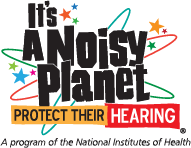It’s a Noisy Planet. Protect Their Hearing.® is a national public education campaign aimed at preteens (children ages 8 to 12), their parents, and other educators with the goal of increasing awareness of the causes and prevention of noise-induced hearing loss.
The science-based program was developed by the National Institute on Deafness and Other Communication Disorders (NIDCD), part of the National Institutes of Health (NIH). Research shows that parents and caregivers are the primary influence on this age group. With Noisy Planet tools and information, parents and other adults can encourage children to adopt healthy hearing habits before and during the time that they develop listening, leisure, and working habits. Noisy Planet’s three key prevention messages are:
- Lower the volume.
- Move away from the noise.
- Use hearing protectors, such as earplugs or earmuffs.
Children are regularly exposed to noise levels that could permanently damage their hearing over time. Decibel levels from activities like doing yard work, playing a band instrument, and attending sports events can lead to hearing loss. Research suggests that hearing loss caused by loud sounds at an early age may speed up age-related hearing loss later in life.
The good news is that hearing loss caused by loud noise is completely preventable.
NIH, NIDCD, and Noisy Planet
Noisy Planet was developed by the National Institute on Deafness and Other Communication Disorders (NIDCD), part of the National Institutes of Health (NIH).
Noisy Planet grew out of Wise Ears, a national health education campaign to increase awareness of hearing loss from noise among all people: workers, employees, health professionals, teachers, parents, children, entertainment industry, unions, industry, state and local government workers, and the general public. Wise Ears was sponsored by NIDCD and the National Institute for Occupational Safety and Health (NIOSH), along with a coalition of national, regional, and local organizations, voluntaries, and state and local government agencies. In 2006, the NIDCD conducted an evaluation of Wise Ears and used findings to strengthen its efforts to prevent noise-induced hearing loss. One of the key strategies from this evaluation was to target youth for future campaign efforts—and Noisy Planet was created. Read more about the Wise Ears Campaign Evaluation.
In 2012, the NIDCD conducted an evaluation of the Noisy Planet Campaign, with the data concluding that the Noisy Planet is effective in reaching target audiences. Read more about the Noisy Planet Campaign Evaluation.
The NIDCD supports and conducts research and research training on the normal and disordered processes of hearing, balance, taste, smell, voice, speech and language and provides health information, based upon scientific discovery, to the public. Visit the NIDCD website for more information about NIDCD programs.
NIH, the nation's medical research agency, includes 27 Institutes and Centers and is a component of the U.S. Department of Health and Human Services. NIH is the primary federal agency conducting and supporting basic, clinical, and translational medical research, and is investigating the causes, treatments, and cures for both common and rare diseases. Visit the NIH website for more information about it.

